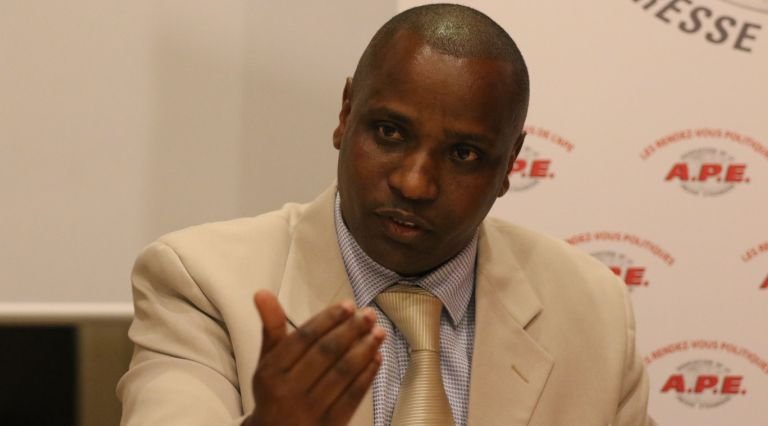Dr Paul Kananura, President of the Mandela Institute of Paris

‘Terrorism Disrupts Strategies for Economic Emergence’
African countries are weakened by terrorism on all levels, as much from a human perspective as a resources perspective. Dr Paul Kananura, President of the Mandela Institute of Paris shares his reflexion with ANA about the effect of terrorism on the economy of African countries.
Interview
What is the current economic trend in African countries?
Economically speaking, the majority of African countries is on an ascending path with an annual growth rate above 5% at the moment. Talking about two-digit growth rates and emergence, which has become more a political slogan than a social project, without evoking the fundamentals of security, is a way to create a diversion to put people to sleep. Between two jihadist axes, going from Mauritania (AQIM) to Somalia (Al-Shabaab), and from Nigeria (Boko Haram) to Lybia (Islamic State), the continent is divided in four. Under this geopolitical configuration, what are the champions of Africa’s emergence relying on?
Do you have numbers, growth rates, GDP?…
In Africa, numbers don’t always reflect the economic and social reality. We have very high growth rates, but this exceptional growth doesn’t create any jobs and does not improve living standards for many people. The problem to solve goes as follows: in the perspective of an African growth that yields no new jobs, how to promote and reconcile employability with lasting security? This is the central issue: creating wealth to reduce inequality in order to prevent safety risks.
Which countries or regions most affected by terrorism have seen their economy crumble?
This is a difficult question to answer with diplomacy because except in Somalia and Mali, and to a lesser extent in Central African Republic, economies did not collapse. As far as the regions go, Sahel and Maghreb are the most concerned. Those countries are differently affected in the tourism sector. In spite of an anticipated growth rate of 5 to 8% in 2016 in those two regions, the risks of an economic downturn are still present. Nigeria, Cameroun, Niger, Chad, Mali, Burkina Faso, Ivory Coast, Algeria, Egypt, Tunisia, Kenya and Somalia: all have been victims of terrorist attacks claimed by Islamists.
Information indicates that Daesh has plans to hit Senegal in 2016 and Benin in 2017. This situation spreads chaos in Africa and impacts development of African States because the cost of war against terrorism cuts the development budget. Terrorism reduces the inflows of foreign capital by lowering tourist attendance and the volume of direct foreign investment.
Do you have numbers illustrating the downturn in the tourism industry of those regions?
The attacks of Tunisia’s Port El Kantaoui and Musée de Bardo have led to 80% of trip cancellations for that destination, causing losses evaluated at 800 million euros at the least. The attacks perpetrated by the Al-Shabaab Jihadists at the Westgate Commercial Centre and the Garissa University in Kenya were directly reflected on the visitor attendance at wildlife parks of this country known for its beautiful fauna. Expecting a steady growth, Kenya had to review its estimates downwards. The attacks of the seaside resort of Grand-Bassam in Ivory Coast and those at hotels in Bamako and Ouagadougou provoked a drop in the number of tourists with monetary impacts not yet determined. Tourism being a growth factor through the inflow of foreign currencies, the impact on the economy and the business climate of those countries is very heavy.
Econometric and macroeconomic estimates demonstrate that Kenya’s and Tunisia’s economies will drop one to two points in growth as a consequence of tourism reduction.
What other sectors are also affected by those economic problems?
Every terrorist act creates a climate of terror and psychosis. Professional activities, leisure and movements of people are weighed down. The attacks often target foreigners and mostly, Westerners. Countries who are victim of attacks are immediately black-listed as not recommended destinations. Destruction of infrastructure and loss of human capital result in an extremely bad record: destroyed buildings, job losses, small shops closing, cost of rescue, cleaning and reconstruction operations, etc. The economic structure of affected countries is weakened and growth is slowed down. The sectors of tourism and foreign investment are the most affected. A safe environment and business go hand-in-hand. No investor wants to invest in an unstable country. That’s why the Mandela Institute encourages African countries to take a clear stand on security in a development dynamic. Terrorism and conflicts are a disrupting factors in State development and economic emergence strategies. For example, Boko Haram in Nigeria, at the border with Cameroun, Chad and Niger, remains a source of insecurity and a threat to the intersecting subregion between West and Central Africa.
In this perspective, how to envision sustainable growth in a context of structural stability? How to transform a tremendous growth into a regional emergence strategy? How to secure investment and develop an efficient plan of private-public partnership?
The fight against terrorism influences socio-economic, political and safety issues. With this in mind, the Mandela Institute accompanies political leaders in their doctrinal and strategic reflexion as to determine a security policy and adopt new strategies to adapt to an ever-evolving terrorist threat.





